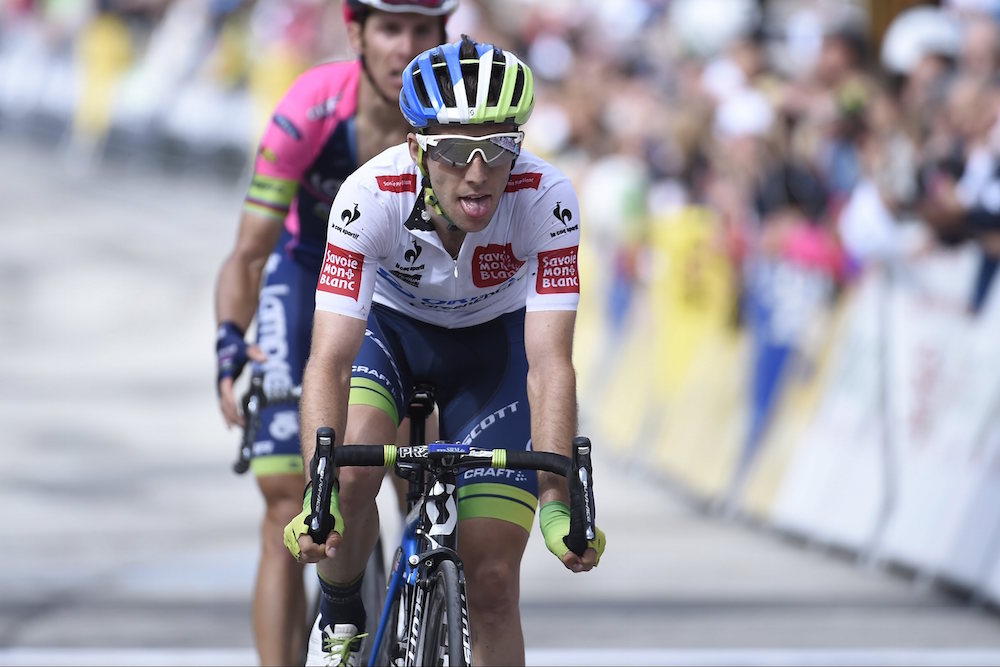What's the deal with asthma and pro cycling?
Why do so many top-level cyclists suffer from asthma – and are the drugs that they're taking enhancing their performance?

Simon Yates at the 2015 Dauphine Libere; In April Yates tested positive for asthma medication (Watson)
When it emerged in April that British pro Simon Yates had failed an in-competition test for the prohibited medication terbutaline, questions were asked about what the substance is and what effect it can have on riders and their performance.
According to his team, Yates is permitted to take the asthma medication under a Therapeutic Use Exemption (TUE), but an administrative error by a team doctor meant that this didn't apply on the day he was tested at Paris-Nice.
TUEs and the medications they can be applied to are once again back in the headlines after medical records of some British athletes, including Sir Bradley Wiggins and Chris Froome, were hacked and published.
Read more
Chris Froome: Data leak only confirms what I previously said
UK Anti-Doping condemns hack of British athletes' data
Bradley Wiggins's and Chris Froome's medical data released by Russian hackers
The latest race content, interviews, features, reviews and expert buying guides, direct to your inbox!
Simon Yates: I worked hard to come back and get this Vuelta win
Simon Yates 'embarrassed and ashamed' over anti-doping rule violation
To find out more about this drug and why so many cyclists apparently require inhalers, Cycling Weekly’s David Bradford spoke to Dr John Dickinson, head of the respiratory clinic at the University of Kent.
CW: Tell us about terbutaline
Dr John Dickinson: Terbutaline is a drug classified as a beta-2 agonist that athletes may use to treat asthma. There are lots of different types of beta-2 agonist available for medical use, but only four of them are allowed to be used by athletes: salmeterol, salbutamol, formoterol and terbutaline. The odd thing about Simon Yates’s case is that terbutaline is the only one of the four that requires a therapeutic use exemption (TUE). Partly for this reason, it is far less commonly used by athletes.
Why is it the only one for which a TUE is required?
This is because there are different ways you can take beta-2 agonists: inhaled form or orally in pill form. Salmeterol doesn’t have an oral form; when testing for salbutamol and formoterol, you can distinguish between an inhaled dose and an orally ingested dose – but you can’t with terbutaline.
What’s the maximum dosage?
With terbutaline, you have to submit a TUE to prove that you have asthma. The controversial part is that once you have your TUE you can use as much as you like. A doctor would normally prescribe a therapeutic dosage, which would not normally be performance-enhancing, but there is nothing from that point to stop the athlete taking larger doses.
Is it performance-enhancing?
There is evidence emerging that large doses of terbutaline in inhaled form may improve sprint and power performance, but there is no strong evidence to suggest they would improve endurance performance. From a performance-enhancement point of view, these drugs don't improve lung function. They are called beta-2 agonists because they act directly on beta-2 adrenoreceptors in the muscle, which improves the strength and power produced in each muscle contraction. It works in a similar way to adrenaline. Essentially you're getting better adaptations in sprinting and power performance. From an endurance point of view for a cyclist, there are not many gains to be had.
>>> Are asthma medicines unofficial PEDs?
Could legal doses enhance performance?
Possibly. The emerging evidence suggests that at the upper limits of WADA-permitted dosages, there is potential to improve sprint and power performance, even within the rules and possibly over the long term. But the dosages required are above therapeutic levels. An athlete would have to be either using the medication wrongly, contrary to advice, or in a deliberate attempt to enhance performance. For me, it's still a grey area, and more research is needed.
How should this risk be managed?
You could bring down the limit, but then you could get into the risk of accidental positives. In 2009, every athlete in every sport had to apply for a TUE to use a beta-2 agonist inhaler. That had two effects: it massively improved the quality of care an athlete received around asthma problems, but it also caused a huge increase in administration. In my opinion, having the TUE requirement in place improves the quality of care for athletes.

What is the prevalence of asthma among elite sportspeople?
In terms of the research we have done, around 21 per cent of the British Olympic team were using an inhaler. It’s higher in sports with a high aerobic element such as cycling and swimming. Some reports suggest that around 40 per cent of British Olympic cyclists use an inhaler, and it's similar in other sports that have a high ventilatory requirement.
Why such a high proportion?
Athletes are more susceptible to asthma than the general population. The reason is that when you're exercising you’re breathing in larger volumes of air, which, if you are susceptible, increases the dose of potential triggers for an asthma response. In cycling, you increase the amount of dry air going into your airway; and out on the road there is air pollution as well. Therefore you are more likely to trigger an inflammatory response, which is likely to cause asthma symptoms. Athletes increase their exposure, so they increase the chances of developing the condition.
>>> How British Cycling's nightmare week unfolded
Why are the rules more liberal for inhaled forms of these drugs?
The reason why the inhalers don't produce the same effect as the oral form is because you inhale the drugs directly into your lungs, where they work directly on the beta-2 adrenoreceptors in the lungs. It would require a large dose in inhaled form to be absorbed into the bloodstream and get a global effect.
Watch: How does weight affect your climbing speed?
How large a dose?
One or two puffs is not going to go anywhere beyond the lungs. Using salbutamol, to get anywhere near a performance-enhancing effect, you would need to take 16 puffs in one go, and that's the upper limit permitted by WADA. The downside of such doses is that they may increase heart rate and cause tremors, so the potential benefits in muscle function you may lose in terms of increased heart rate. If you wanted to cheat, there would be far more effective ways.
Jack Elton-Walters hails from the Isle of Wight, and would be quick to tell anyone that it's his favourite place to ride. He has covered a varied range of topics for Cycling Weekly, producing articles focusing on tech, professional racing and cycling culture. He moved on to work for Cyclist Magazine in 2017 where he stayed for four years until going freelance. He now returns to Cycling Weekly from time-to-time to cover racing, review cycling gear and write longer features for print and online.